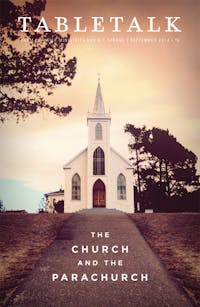
Request your free, three-month trial to Tabletalk magazine. You’ll receive the print issue monthly and gain immediate digital access to decades of archives. This trial is risk-free. No credit card required.
Try Tabletalk NowAlready receive Tabletalk magazine every month?
Verify your email address to gain unlimited access.
The church possesses two books to aid in worship: the Word of God and the hymnal. The Scriptures stand as the perfect and unwavering revelation of God throughout the ages. It is our rule, and the only infallible word on all matters of our faith and practice. The hymnal exists in submission to the authority of Scripture and assists the people of God in singing truth. Its songs are an ever-flowing stream, sung by people responding to God in worship.
Choosing hymns for the local church is a sacred task. Even when the hymnal used is electronic and lacks binding and pages, the practice of Christian singing remains vital. As Colossians 3:16 says,
Let the word of Christ dwell in you richly, teaching and admonishing one another in all wisdom, singing psalms and hymns and spiritual songs, with thankfulness in your hearts to God.
In this text, Paul teaches the Colossians the importance of singing in the local church. The hymns we sing are not to be chosen clumsily, but with intentionality and with care. Hymns have the ability to teach us, to admonish us, and to provoke our hearts to worship our Savior with thankfulness.
Choose Hymns That Teach
The hymns of the church ought to be built on, shaped by, and saturated with the Word of God. While the New Testament is silent on many of the specifics of corporate worship, Scripture is clear that the Word of Christ must be central. When the hymns we sing are aligned with the Word of God, our souls are nourished by its truth. Singing is a unique way to “let the word of Christ dwell richly” in us. One reason our songs should be closely tied to the Word of God is their didactic effects. Singing for the Christian is formative and responsive, and therefore must be informed by Scripture. We learn what we sing.
Let us think of singing as a form of exposition that uses poetry to teach the Word of God. When Isaac Watts published Psalms, Hymns, and Spiritual Songs, his intention was not to sing Scripture line by line, but to create poetic and emotive renditions of Scripture that allow a church to sing the truths of Scripture. Songs are sermons. They don’t work like homiletical exegesis, but they articulate, exegete, and pronounce biblical truths. Our hymns teach and shape the way people view God, man, Christ, and how we are to live in light of the gospel.
One way to ensure our singing is biblical is to comb through our songs to see if we cover the breadth of themes presented throughout the canon of Scripture. Our songs should be held up to the light of God’s Word to ensure we are singing the glories of its truth.
Choose Hymns That Admonish
The songs we sing as a church are meant to teach and admonish. When we gather as the church on the Lord’s Day, we need to be admonished in various ways. Throughout the week, other things call for our praise, attention, and affection. Singing hymns of God’s character reminds us of His greatness. Singing hymns of our sin reminds us of the role of confession. By singing hymns of the atonement, we remind one another of the efficacy of the work of Jesus. Hymns of consecration remind us of the dependence of Christians upon the steadfast grace of God.
We sing to admonish the weak and the weary that their salvation is in God. We sing to admonish the doubting to believe and be renewed. We sing to admonish the suffering that they have a hope that is unwavering.
Our songs ought to exhort and admonish. Our songs ought to encourage and remind. In this practice of song, God’s people will be pointed to the Scriptures, reminded of truth, and rooted in the gospel of Christ.
Choose Hymns That Provoke Thankful Hearts
We should choose hymns that provoke thankful hearts. When we sing robust theological truth, our hearts should erupt with praise. The aim of singing hymns is engaging both the head and the heart. The reason we read, study, and meditate on the Scriptures is not primarily so that we might amass knowledge, but so that our knowledge would lead to worship. The chief end of theology is doxology.
In choosing hymns for corporate worship, we should choose songs that make our hearts sing. From the content of the lyrics to the movement of the melody, we want beauty and transcendence to come together and serve the people of God. In our pursuit of theological precision, let us not neglect the pursuit of heartfelt response.
A church’s hymns are not a mere preamble to the sermon. Singing is not obligatory filler time to warm up a congregation. Singing is a holy practice. We sing because God has commanded it, and our songs should fill our hearts with thankfulness and delight in our great God.
